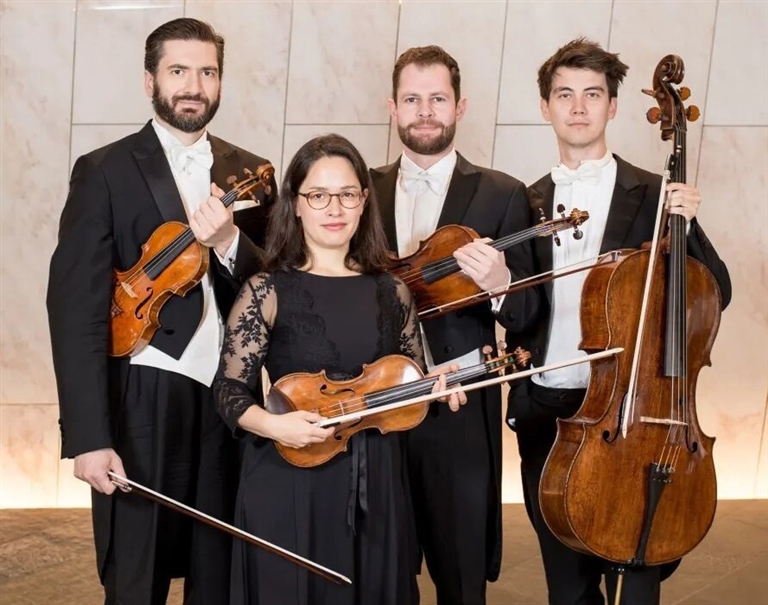
Debra Li debra_lidan@163.com WIDELY regarded as the quintessential chamber ensemble, the string quartet offers a concentrated glimpse into the expressive possibilities and technical demands of classical music. With four players listening and responding to one another, the ensemble becomes a living, breathing conversation. The standard configuration — two violins, one viola and one cello — was codified by Haydn and famously described by Goethe as “four wise men conversing.” Since Beethoven— who wrote 16 string quartets — composers have increasingly embraced the form as an intimate and potent vehicle for personal emotion and philosophical reflection. Legendary quartets such as the Busch Quartet, Quartetto Italiano, Amadeus Quartet, Alban Berg Quartett and Borodin Quartet refined their ensemble sound over decades, shaping the individual minds and techniques of their members into a single, unified instrument. By contrast, the Philharmonic String Quartet Berlin brings the fresh vitality of our era to this venerable tradition. On the evening of Oct. 25, four members of the Berlin Philharmonic Orchestra (BPO) will perform works by Mozart, Beethoven and Dvořák for local audiences. The quartet debuted in 2019 with a matinee at the BPO and released its first album in March 2022, featuring works by Dvořák and Josef Suk. The ensemble is a regular invitee to the Easter Festival in Baden‑Baden, where its performances range from classical staples to contemporary repertoire. The current lineup comprises violinists Helena Madoka Berg and Dorian Xhoxhi, violist Tobias Reifland and cellist Christoph Heesch. Berg, born into a musical family, is a Juilliard graduate who studied with Robert Mann. Xhoxhi trained at the Hanns Eisler School of Music and formerly played with the Deutsche Symphonie‑Orchester Berlin before joining the BPO. Reifland, who joined the BPO in 2022, has won prizes at the International Max Rostal and International Anton Rubinstein competitions. Heesch, widely regarded as one of today’s most promising cellists, is a laureate of the Antonio Janigro and Witold Lutosławski competitions. The concert opens with Mozart’s “Divertimento in F major, K. 138,” a compact three‑movement work composed when he was 16. With its fast–slow–fast design, bright rhythms and graceful melodic lines, the piece reflects both youthful verve and the influence of Italianate style. Listeners will then hear Beethoven’s “String Quartet No. 6 in B‑flat major, Op. 18, No. 6.” Composed on the cusp of his middle “heroic” period, this quartet already reveals Beethoven’s expansive imagination. Its final movement, in particular, juxtaposes contrasting sections in which sorrow and joy, restraint and explosive intensity, intersect and clash. The program concludes with Dvořák’s “String Quartet No. 13 in G major, Op. 106,” where songlike Bohemian melodies intertwine with vigorous rhythms and shifting emotional currents that move between optimism and introspection. The work is suffused with the composer’s deep longing for his homeland and the serene joy of return. Time: 7:30 p.m., Oct. 25 Tickets: 100-480 yuan Venue: 5/F, Chamber Hall, Shenzhen Concert Hall | 
